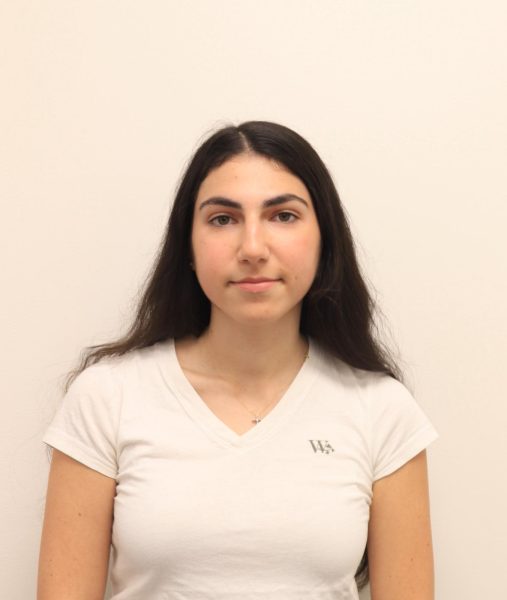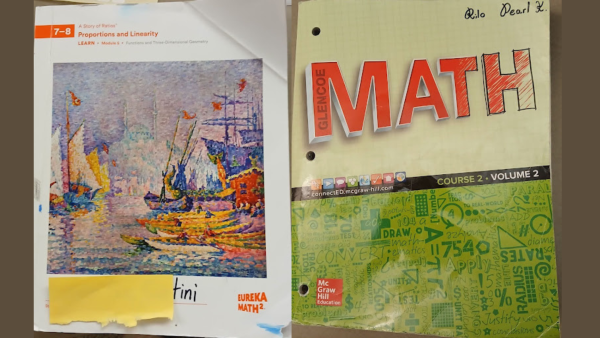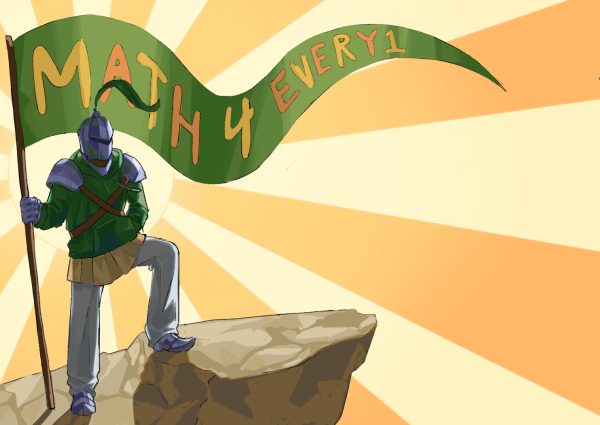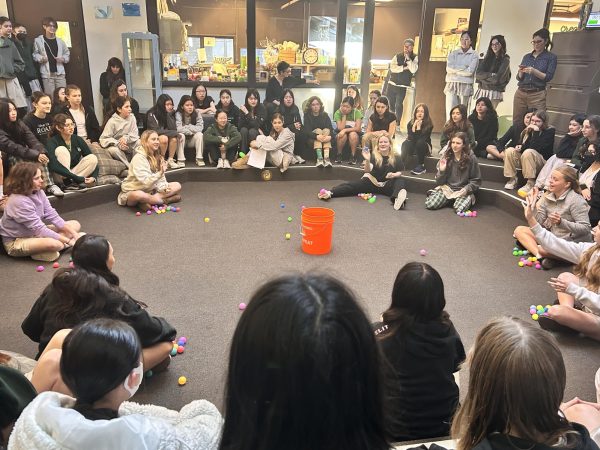Opinion: Put Self-Care on Your To-Do List
After a long, exhausting day of school and another three hours of homework, I curl up on my bed and wrap blankets around me like I am a burrito, ready to settle down and relax before going to sleep. As I open my computer and begin playing another episode of my new favorite show, Criminal Minds, a thought crosses my mind: Should I be doing something more productive with my time?
For me, the meaning of the word “productive” has drastically changed during the pandemic. Being productive no longer means completing all of the homework due tomorrow. Now, being productive means getting ahead, completing assignments that haven’t been assigned or teaching myself concepts that haven’t yet been introduced. At this rate and by this definition of productive, I’ll never be finished with anything. There will always be more to do.
There are ten minutes left in the episode, and just before Agent Aaron Hotchner and his team are about to storm into the suspect’s house, I, unfortunately, say goodbye and close the browser tab. After placing my computer on my desk, I grab the book Of Mice and Men for English class. I should get ahead on reading, right? Moving my eyes across the page, I try focusing on the story in front of me, but I am too tired to think straight. Shouldn’t I just go relax? It’s important to take care of myself, right? Grabbing my computer and nestling back in my bed, I resume the intriguing episode. While breathing deeply and watching television, I cannot help but remind myself of the homework I still need to complete. I force myself to stay cuddled in my bed, but not even the satisfaction of watching Agent Hotchner and Agent Rossi solve a crime can assuage the guilt I suffer in the back of my mind.
This extreme unending obsession with being productive is what experts have termed toxic productivity. This is certainly not a problem everyone encounters. Some even experience the opposite. In an interview with the Huffington Post, Kathryn Esquer, a psychologist and founder of the Therapist Network, explained, “Toxic productivity can make us feel like a failure if we’re not constantly ‘doing.’ When toxic productivity is leading your life, you judge yourself every day for what you haven’t done, rather than looking at what you have accomplished.”
Dr. Julie Smith, a clinical psychologist who is an online educator and owner of a private practice in England, explained, “We also have a wider cultural problem in our society. That pressure to be constantly available online and on social media means that the world almost has a constant view into our lives. That compels pressure to appear a certain way to family, friends, or potential employers. We are bombarded with outbursts every day that encourage ourselves to measure our self-worth on our productivity.” Our society is obsessed with productivity, which encourages both students and adults to value completing work over their mental health. Constant productivity is seen as a gateway to success and happiness.
Courtney Seiberling, Middle and Upper School Yoga Teacher, added, “I think productivity is a huge issue in general, pandemic or not. Our culture values work and uses exhaustion as an indicator of success and productivity as a merit of our value as humans. I find this completely backwards to how we should operate yet fight this within myself all the time (and I work in the mindfulness field!).”
However, the pandemic did not invent this damaging need to be productive all the time; it instead intensified the pre-existing problem that stems from a society that praises constant productivity. Societal pressures to always exceed expectations has caused this toxic cycle. Esquer explained, “We could have used our free time to rest, recharge, and restore ourselves, but many of us filled those hours with more work as a way to feel worthy, fulfilled, and in control.” Other experts believe that because all of our routines were on pause, people began to have a large amount of free time that they were unsure how to best use.
Kristen D. ’25 shared, “I think the feeling of being constantly productive during the pandemic is a good and bad thing. I think it is good to be productive and get things done, but it is also really important to give yourself a break and do something for yourself. I also think the reason why we have the feeling to be constantly productive is because during the pandemic, we don’t have our usual things to do such as sports and other extracurricular activities. So, we have to find other ways to keep ourselves busy/entertained, and one of those ways is to be constantly productive.”
Rachel K. ’24 said, “What I’ve since realized is that the divide between school and home life is almost completely gone. Before quarantine, you could socialize and learn then go home with a few assignments and relax. Now, we’re doing all classwork, classes, and homework in one place and for most people in one room. Without the divide between school and home, you either feel the need to constantly work or to never get out of bed, both being, quite honestly, horribly unhealthy paths.”
Stephanie C. ’25 said, “I’ve always made sure that I do my homework and turn things in on time, but I think that during the pandemic, homework has been more of a priority. Because I have nowhere else to go, I might as well as stay home and do homework.”
She continued, “I pass up opportunities that I probably should’ve taken. For example, if I want to go on a walk with my family, take a break from homework, or go outside, I’ll pass that because I want to finish all of my homework.”
Susie Murdock, Lower and Middle School Learning Support Specialist, shared, “I have observed some students experience ‘anti-productivity.’ These students ‘feel’ toxic productivity happening around them; it may, or may not, be happening as they perceive it. Unlike the previous group, these students have a strong belief that the quality (and the quantity) of work expected of them is high. They believe that their teachers and parents hold them to a high standard, and they are aware of peers who are producing (what they perceive to be) large volumes of high-quality work and playing the piano and participating in sports and clubs, etc.”
For my entire life, I have asked myself the question “What should I be doing right now?” No matter what day it is, Christmas or a Saturday, I am constantly putting pressure on myself to work. There is hardly ever a time where I do nothing.
Dealing with the cycle of toxic productivity has been difficult for me during the pandemic. It has caused me, along with many others, to judge myself based on the tasks I complete throughout the day. The solution to this problem is not to stop working hard or finishing assignments. Instead, I need to lead my own life, and not allow work or productivity to lead it, but this is easier said than done.
Dr. Joanne Barron, a psychologist who has her own practice in California and specializes in anxiety, depression, and trauma, said, “I was reading somewhere that what Americans have done when we entered the pandemic is work. We work more, we’re on zoom all the time, and now because we’re not going home at the end of the day, we’re working from morning to night. When we’re not working, many people are feeling depressed. Their identity is so tied up with what they do, what they produce, and what they achieve, so when they’re unable to do that, they’re really having a crisis about identity.”
Even when I try to relax and take a break, I am overwhelmed by guilt. To eliminate these negative feelings, I have taken the question “What should I be doing right now?” and replaced it with “What do I want to do now?” and “What do I get to do now?” When I sit down to do homework after school, I acknowledge that the assignments I have to do are time-consuming and frustrating at times, but I also remind myself of how fortunate I am to have an education. By associating assignments with positive thoughts, I gradually eliminate the mentality of having to work.
Simone Milases, a business coach and author of “Joy and Business,” said, “You need to find out if you are really choosing what is important to you, or choosing what you think you should do or what society has told you should be important. So much of toxic productivity is doing what we think we should be doing instead of choosing what is true for us.” Not overworking myself, being patient with myself, and putting self-care on my to-do list have been most rewarding and “true for me.”

Sophene is a senior and in her sixth year on Spyglass. In her free time, she enjoys baking, spending time with family, and watching Gilmore Girls and Friends.




























![Dr. Zanita Kelly, Director of Lower and Middle School, pictured above, and the rest of Westridge Administration were instrumental to providing Westridge faculty and staff the support they needed after the Eaton fire. "[Teachers] are part of the community," said Dr. Kelly. "Just like our families and students."](https://westridgespyglass.org/wp-content/uploads/2025/03/dr.-kellyyy-1-e1748143600809.png)

























